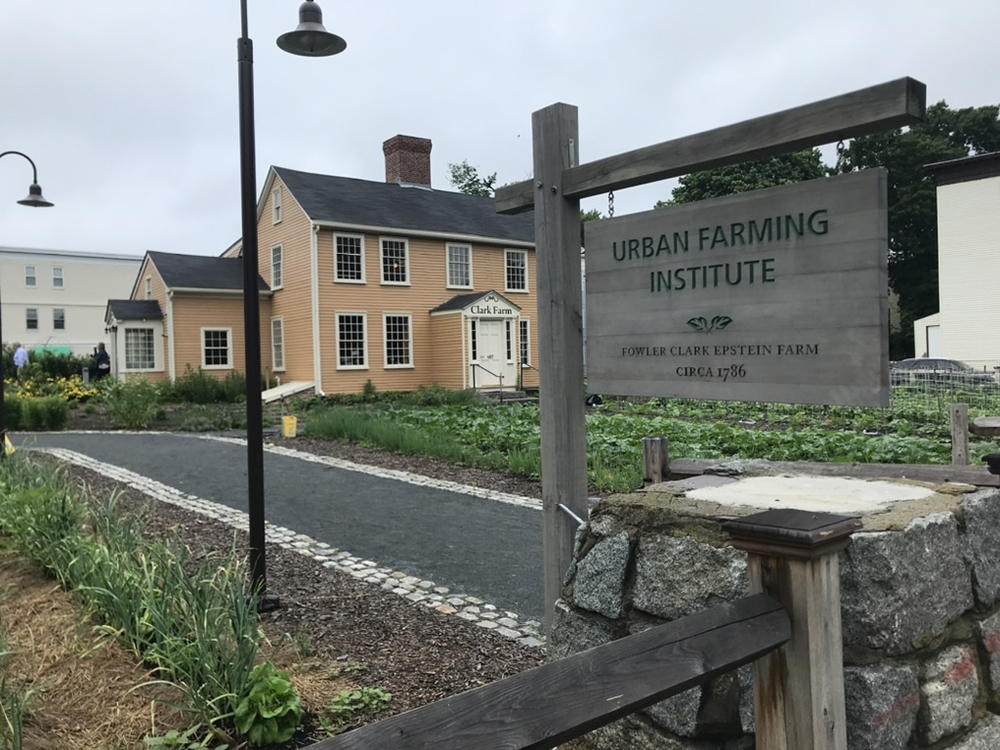Historic Boston sells Mattapan Farm to Urban Farm Institute

Boston, MA According to Historic Boston Inc. and the Urban Farm Institute of Boston, the institute has purchased the historic Fowler Clark Epstein Farm, at 487 Norfolk Ave. in Mattapan, a property redeveloped by HBI for UFI in 2018.
The restored property is headquarters and permanent home for UFI’s mission of developing and promoting urban farming that engages individuals in growing food and building a healthy community.
“By working together, this unique historic place is preserved and an important resource for UFI and the Mattapan neighborhood,” said Kathy Kottaridis, executive director of Historic Boston. “And it’s now in the hands of a skilled nonprofit operator at about a third of the cost of what it would have taken them to transform the property themselves.”
The building was purchased in 2015 by HBI when the 18th century Fowler Clark Epstein Farm had fallen into disrepair and faced an uncertain future. Working with UFI, the Trust for Public Land and North Bennet Street School, HBI and its partners raised nearly $2 million in charitable support and garnered extraordinary generosity from local businesses, contractors and individuals. The collaborative effort transformed the historic property’s $3.8 million into a urban farming headquarters for UFI.
The partners rehabilitated the distressed farmhouse and barn in 2018, transforming it from a private residence into a sprawling urban farming center with classrooms, offices, a produce processing center, and demonstration farm beds, under the direction of UFI.
“This is a momentous day for UFI,” said UFI’s executive director, Patricia Spence. “This is a place where my brother and I rode our bikes to as children. The plans put in place eight years ago have come to fruition, and UFI now controls the land on which it farms, trains and welcomes the community.”
In compliance with certain rules for utilization of federal historic tax credits for the property’s redevelopment, UFI occupied and managed the historic property as tenant for the last five years, although the property’s restoration was planned and intended for UFI’s long-term occupancy.
“The farm is home to us, and has become a special center for our farmers and our neighbors,” said Spence. “Fresh food is vital to a healthy community and from this place we share our bounty and teach the principles of cultivation and growth.”
UFI paid $1.4 million for the farm, a sum that extinguished a debt held by HBI with Eastern Bank. The transaction closed on Jan. 12, 2024.
For Historic Boston Inc., the farm’s sale concluded a nine-year odyssey that began when the 64-year old historic preservation organization purchased the property from the estate of the Epstein family after years of abandonment and distress.
Historic Boston financed and managed the property’s redevelopment, which included full restoration of the 1786 house and 1860s carriage barn as education space, a farm stand and teaching kitchen. The surrounding landscape was transformed to accommodate farm beds, a greenhouse, and irrigation systems.
“Our projects fulfill the surrounding communities’ goals by bringing threatened or underappreciated historic buildings back into the life of the community in a way that also honors their history,” said Kottaridis. “Re-activation of historic places and their local ownership are core goals of our projects, so we are honored to have played a role in helping to make this UFI’s home.”
At closing, UFI and HBI expressed gratitude to their partners in the development of the property. The Trust for Public Land raised funds and provided technical support for the site’s farming infrastructure, and the North Bennet Street School contributed to both buildings’ preservation carpentry. The property’s redevelopment also garnered nearly $2 million in charitable contributions from area foundations, individuals and corporations.
“The future of this historic place is bright because so many people gave selflessly. We thank our many donors, partners, the UFI family and our amazing community members who made this purchase a dream come true in Mattapan,” said Spence.
Newmark negotiates sale of 10 Liberty Sq. and 12 Post Office Sq.

Four tips for a smooth 1031 Exchange - by Bill Lopriore

Make PR pop by highlighting unique angles - by Stanley Hurwitz

How COVID-19 has impacted office leasing - by Noble Allen and John Sokul








.png)
